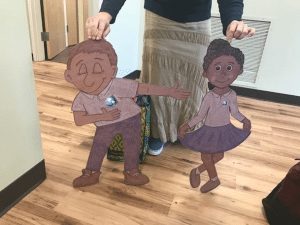Montessori School the Absorbent Mind
Maria Montessori describes a unique time in life where the brain absorbs information like a sponge. This special period occurs during the first plane of development, covering the first six years of life. Because of the way a child effortlessly soaks up knowledge, Montessori refers to it as The Absorbent Mind. It is during this time that a person’s character forms.
How does The Absorbent Mind work?
Imagine how a child learns language. There are no formal lessons; instead, the child soaks up language using his senses and begins organically to communicate. This brain mechanism controls early learning.
The fact is, we are born ready to learn. During the first six years of her life, a child absorbs more knowledge than she ever will again. What she learns in this phase makes a deep impression and forms her personality.
Sensitive Periods
A child experiences unique phases throughout the first plane of development. These stages occur in a predictable order, and they are called sensitive periods.
When the child enters into a sensitive period, he becomes fascinated and hyper-focused on certain tasks. For example, around age one, he becomes very interested in small objects. Around age two, he cares very much that everything is in its place and that events occur in a predictable order.
There are sensitive periods for learning to walk, toilet training, and learning to read. It is most effective to follow the child’s natural progression for the Absorbent Mind. This allows him the freedom to construct his own learning and to absorb knowledge quickly while enjoying himself greatly.
Experiential Learning
Maria Montessori knew that young children learn best through hands-on experiences. Knowledge acquisition is entirely concrete throughout the first plane of development. It is only when the child is older that she can conceptualize abstractions. Children in the first plane of development learn best through experience and direct sensations. This exposure is also a necessary prerequisite to later abstract thinking.
The Prepared Environment
Although learning is constructed by the learner for the Absorbent Mind, the teacher has a vital role. Her task is to prepare and arrange the environment so that the children can access the tools they need to learn. This is known as the prepared environment.
The key is to make classroom materials accessible and engaging. The guide must pay careful attention to each child’s progression through the sensitive periods. She will attempt to push each child to the limit of his efforts, perfectly balancing challenge and success.
Freedom within Limits
One important concept of the prepared environment is freedom within specifically defined limits. The guide decides which materials to introduce and demonstrates the correct way to use them. From there, the children are free to choose what to work on and how long to spend on each task.
If the materials and environment are prepared just right, the absorbent minds will dive in and begin to self-construct.
Control for Error
We want the materials a young child works with to empower them. Recognizing and correcting one’s own error is the most effective way to learn in the Absorbent Mind period.
An example of control for error is found in one of the first Montessori materials: the knobbed cylinders. If one cylinder is placed incorrectly, another will be left at the end. Teachers should resist the urge to correct or hint at what might be wrong. Give the child the gift of discovery by providing materials where he can self-correct.
The Urgency of Educating the Absorbent Mind
To drive this point home, an absorbent mind will never be so again. We must take advantage of this special time to teach the whole child so many, many things.
It is also quite scary to realize that the Absorbent Mind years are so formative: whatever children absorb, positive or negative, will shape their character. It is our responsibility to provide good, helpful things for them to soak up.


